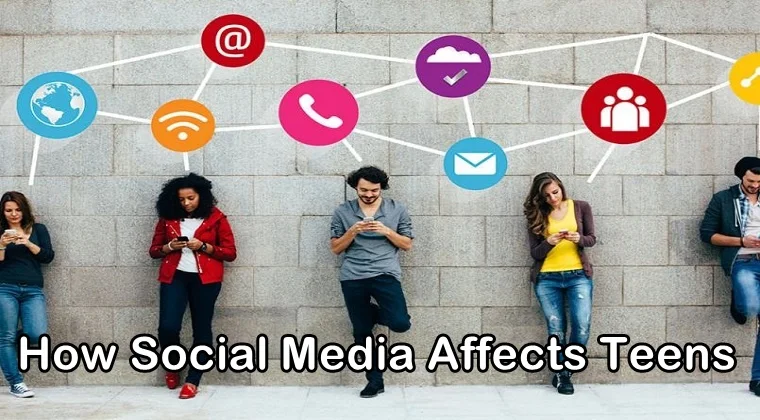Teens and Social Media: How Social Media Affects Teens Wellbeing

Teens and social media go hand in hand today. In the digital age that we are a part of, it should not come as a surprise that the pressure to be constantly available on social media has become a real big challenge for today’s children and teens.
They have more grasp, know-how, and dependence on social media sites than most of the adults. This is why they are found using social media sites at much higher rates. A report published by Common Sense Media found that around 75 percent of American teens have their presence on social media. Social media has become a permanent part of the lives of the majority of teens now.
Social media can be addictive for many teens. In a recent study, it was found that there are certain regions in a teen’s brain that become activated by receiving “likes” on social media. The same regions when activates make them use social media more. This proves that social media affects a teen’s mental health significantly. To find out what teens are doing online, parents must consider social media monitoring.
Teens and Social Media: How Social Media Affects Teens
Unquestionably, social media plays an important role in enhancing social connections between teens and helping them learn valuable communication and technical skills. Besides helping out teens in many ways, the presence of social media is negatively impacting the young minds.
Have you ever wondered what impact social media is having on young teen minds? Several reports suggest that the impact can be significant. By spending too much time online, they can’t self-regulate their screen time. As a result, there is an increase in health risks.
In addition to that, many teens are more susceptible to online threats such as cyberbullying, sexting, pornography, peer pressure, pedophilia, etc., which can make the online world more dangerous for them.
When teens spend too much time on social media sites, they also suffer from several certain health problems. Below, we have given an overview of the common mental health-related problems teens can experience from spending too much time on social media.
Depression
Researchers have found out a link between depression and social media. By using too much social media or spending too much time on social media platforms, teens can suffer from depression. They can experience a decrease in social activity and an increase in solitude.
In a recent study, it was proved that people who used more than seven different social media sites had more than three times the risk of depression than people who used two or fewer sites. In addition to that, many other studies have shown that excessive use of social media can cause children to experience low self-esteem.
In an article published by the NY Times, Dr. Rich said teens are seeing four different things when they are using the internet including gaming, social media, pornography, and information bingeing. These things have created health problems like depression among many teens.
Anxiety
When teens start using social media, it doesn’t take them much time to become emotionally invested in their accounts. They feel they have a lot of pressure on social media. For instance, they have to respond to others instantly, take perfect photos and post them on their accounts, write well-written captions. All of these pressures can cause them a great deal of anxiety.
As a teen’s social circle become to expand online, they become more anxious about keeping up with everyone and everything on social media. Many young female teens often worry about what others might think of them when they post a picture on social media and how they will respond to them when they meet them in person.
Other online problems like slut-shaming, body-shaming, and cyberbullying are also making a lot of teens anxious than ever.
Sleep-related Problems
Sometimes teens spend so many hours using social media platforms that they start to lose their valuable sleep. When they do not take proper sleep, they tend to face many other problems such as moodiness, overeating, depression, anxiety, and a significant drop in school grades.
Spending long and interrupted hours on social media can trigger loss of sleep and have a significant impact on a teen’s sleeping routine. Most of the teens use social media all day night and sleep only for a few hours.
Lack of sleep can make teens feel tired all the time, lowering their immune system. Additionally, they also feel less happy when they do not get enough sleep. Teens should get more sleep than adults so using social media in the middle of the night can be dangerous to their physical and mental health.
Envy
Social media spreads feelings of jealousy and envy among teens. While these emotions are quite normal, they can wreak havoc on teen brains if they start realizing that they haven’t possessed or experienced something that someone else already has.
Usually, people post positive things on social media and share their anecdotes with others, showing off how happy and exciting their lives are than the rest. By reading such posts, teens can develop an inferiority complex and they start wishing for such an exciting life as well.
Unfortunately, what most teens fail to understand is that people only post good and positive things on social media to show off what they have. In reality, their lives are quite different than what they portray on social media. Their life may look perfect online but they are dealing with their own struggles just like anyone else offline.
Still, many teens are convinced that others are leading a happier life than them. As a result, they fall into depression, loneliness, anxiety, and even anger in some cases. When they cannot control their feelings of anger, they can become rebellious and start propagating their hatred on others in the form of hateful comments, trolling, and bullying.
Communication Problems
While social media is a great platform for teens to keep in touch with their friends and family, it is not the same as a face-to-face conversation. A teen cannot see a person’s facial expression or hear their tone of voice while they are communicating with them online. As a result, the occurrence of misunderstandings is quite common, especially when people are trying to be funny or sarcastic online.
Teens are occupied in checking social media that they forget to interact with the people who are right in front of them. This is why many friendships and relationships suffer when social media takes a center stage in someone’s life.
When teens go out with their friends to explore new places or to try new food, they busy themselves in taking good pictures that they can share on social media. Instead of having fun in real life, they spend time online even when they are out. Consequently, many friendships suffer because of this attitude.








